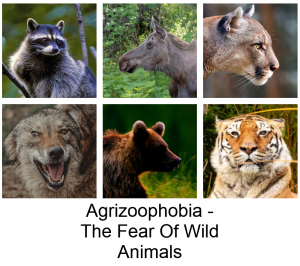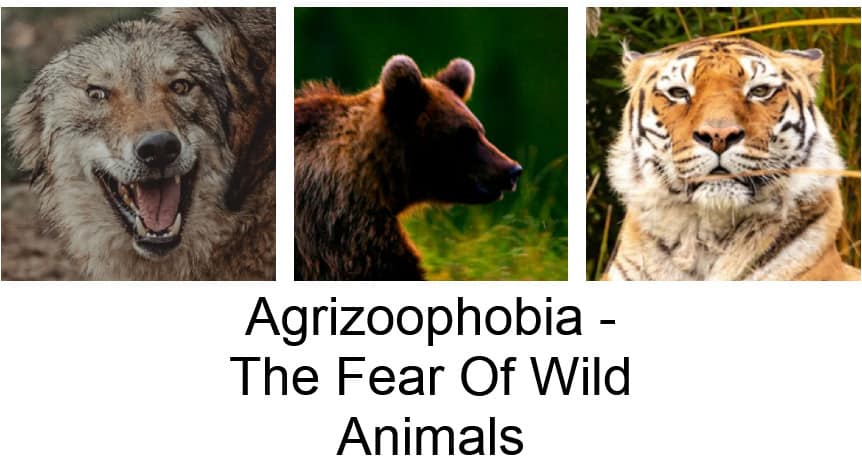Share This Article
Fear of Wild Animals: Greatest Animal Fear
Have you ever come across wildlife shows while channel surfing and quickly changed the channel? Does the thought of encountering any wild animal, even a raccoon, fill you with dread? Do you have trouble focusing on tasks because you’re afraid that wild animals may attack you?
If this sounds familiar, you may be dealing with agrizoophobia or the fear of wild animals.
Agrizoophobia is an irrational fear related to wildlife, which can make one feel constantly worried and afraid. In this article, we’ll take a closer look at what agrizoophobia entails and some common symptoms you should watch for, as well as explore effective strategies to overcome it.

What You Need to Know about Agrizoophobia
So, now you know what your fear of wild animals is called. But what does agrizoophobia mean?
The term “agrizoophobia” is derived from the combination of agros (Greek for ‘field’), zoo (Greek for ‘animal’), and phobia (Greek for ‘fear’).
And while the agrizoophobia meaning is simple, it’s often confused with zoophobia, which is a phobia of all animals. Agrizoophobia, however, is only related to wild animals. So, a person with this phobia may enjoy being around domesticated animals like dogs, cats, or horses, but even the thought of wild animals like tigers, foxes, or wolves may cause extreme fear and panic.
Now, fearing wild animals is quite understandable. Wildlife can be scary, and many wild animals are dangerous. In fact, agrizoophobia belongs to the list of most common phobias because many people are naturally afraid of creatures who may cause harm.
However, what distinguishes fear from a phobia is that a phobia is more extreme. There may even be times when the phobia can cause debilitating effects in a person’s life.
Agrizoophobia Causes
If you have agrizoophobia, you may find yourself wondering, “Why am I scared of animals?” The development of phobias such as agrizoophobia is a complicated process that involves numerous factors. That’s why it is recommended you consult a mental health professional to identify specific triggers.
Like most phobias, however, agrizoophobia is also a combination of a person’s genetic history and learned experiences.
If an individual has had a traumatic encounter with a wild animal, the event may cause them to be afraid of all types of wild animals instead of only that one particular creature.
Even if you live in a place where wild animals are rare, you may develop agrizoophobia if your culture or community teaches people to be afraid of wildlife. For example, if you watch a lot of movies about animal attacks, you might come to fear them more than you should. Children can also become fearful of wild animals, because they are taught to be afraid by their parents, caregivers, or other adults.
Phobias may also result from genetic predispositions. So, if there is a family history of phobia or anxiety, you’re at a greater risk of developing a phobia.
Certain brain chemicals may also be responsible for the development of extreme fears such as agrizoophobia. This is especially the case when the brain’s fear center, the amygdala, becomes hyperactive.
Agrizoophobia Symptoms
Agrizoophobia symptoms, both physical and psychological, may vary among individuals. Take a look at some of the most common signs of agrizoophobia.
Physical Symptoms
- Heart palpitations
- Chest pain
- Panting
- Difficulty breathing
- Perspiring
- Stomachache
- Muscle tension
- Difficulty sleeping
- Shaking
Psychological Symptoms
- Obsessive thoughts about wild animals
- Constantly remembering previous encounters or creating imaginary scenarios about wild animals
- Worrying about meeting wild animals in everyday life
- Difficulty going somewhere where wild animals may be present
- Fear of public spaces
- Depression
- Low self-confidence
You may have one or more of these symptoms, or you may have others not mentioned in this list. It’s important to seek the help of a mental health professional to better understand your phobia. They may also rule out underlying medical conditions that may be confused with agrizoophobia.
Agrizoophobia Treatment
Currently, there is no definite cure for phobias. However, there are many therapies that will help manage it. So, while you may not be able to completely wipe out your fear of wild animals, you can learn to cope regardless of the fear.
Self-Help
Before seeking professional help, there are several self-help methods you can try. Relaxation techniques such as meditation, breathing exercises, and yoga, for example, are known to help deal with the anxiety and depression that may occur from a phobia.
You may also consider maintaining a journal to keep track of your thoughts and emotions. A written record of your experiences will also help you track your triggers so you can be better prepared to deal with them.
Cognitive Behavioral Therapy (CBT)
Cognitive behavioral therapy (CBT) focuses on identifying thoughts that cause agrizoophobia and the behaviors that accompany it so that they can be changed. In CBT, the therapist helps the client become familiar with his or her fears and guides them to overcome it.
Exposure Therapy
An exposure therapist will gradually expose an individual with a phobia to the feared stimulus (in this case, wild animals) in a safe environment. This may be done in real life or virtual reality. The exposure is done in small steps to help the patient learn to cope with wild animals without being too challenged.
Coping with Agrizoophobia
It may not be possible to entirely erase your fear of wild animals, especially because fearing wild animals that may hurt you is a healthy, natural response. However, you can learn to dial down your anxiety level, so you can live a more normal life.
If the fear of wild animals interferes with daily life, consider consulting with a professional. Also, try seeking support from your friends and loved ones, or join an agrizoophobia support group.
Most important of all, don’t put yourself down because you’re afraid of wild animals. It is much easier to make changes if you don’t punish yourself for your perceived flaws. Remind yourself that being scared of wild animals is not silly; it is just your brain creating a fear response that is greater than average.
The Fear of Wild Animals Ain’t So Wild After All!
You may have learned about agrizoophobia while researching your fear of wild animals. And you may have let out a sigh of relief when you realized it’s not so “irrational” after all. Yet you may still have some work to do on your exaggerated fear response.
Learning more about your condition already puts you ahead of the game. Here’s to better life experiences, whether wild animals are involved or not!




